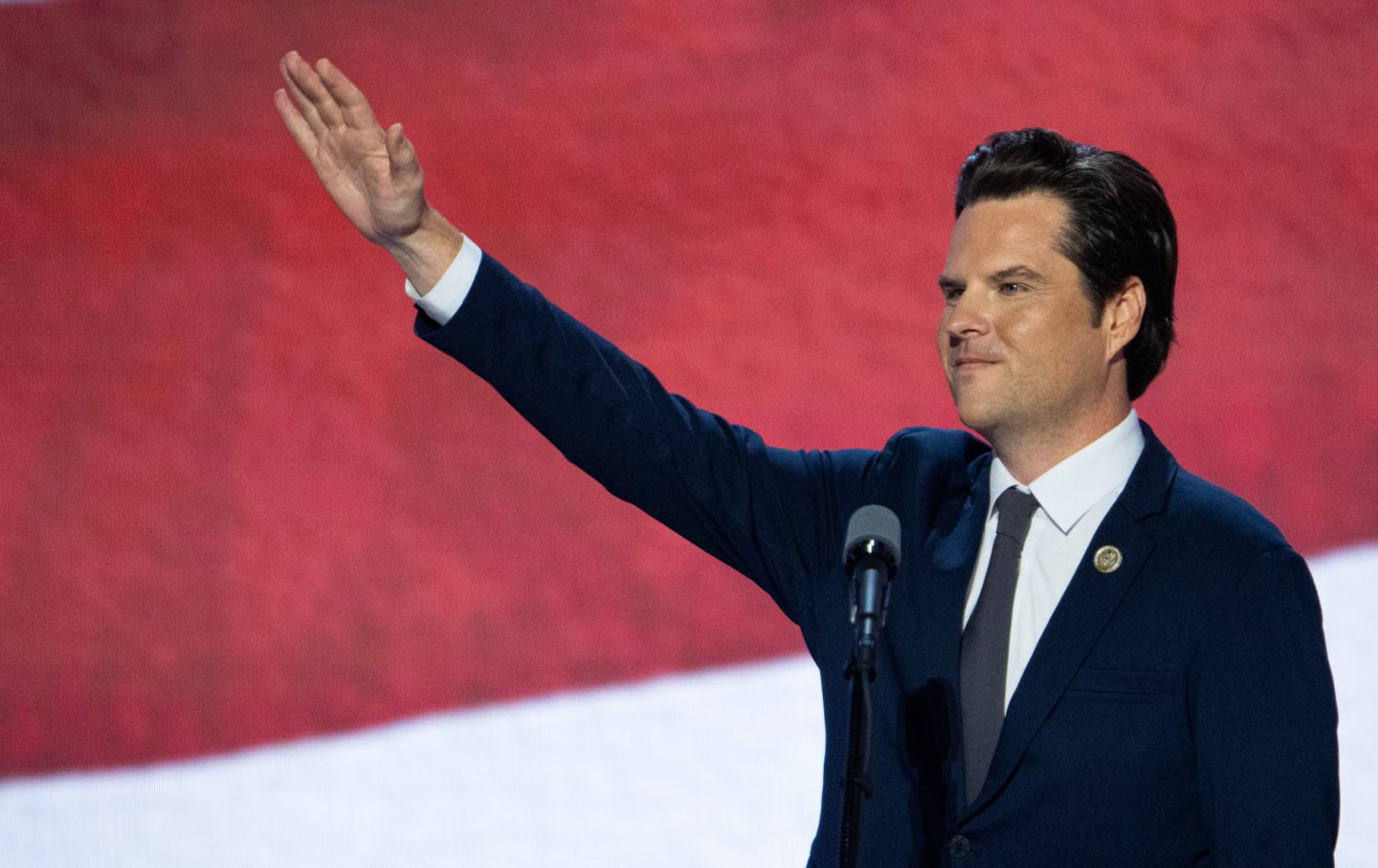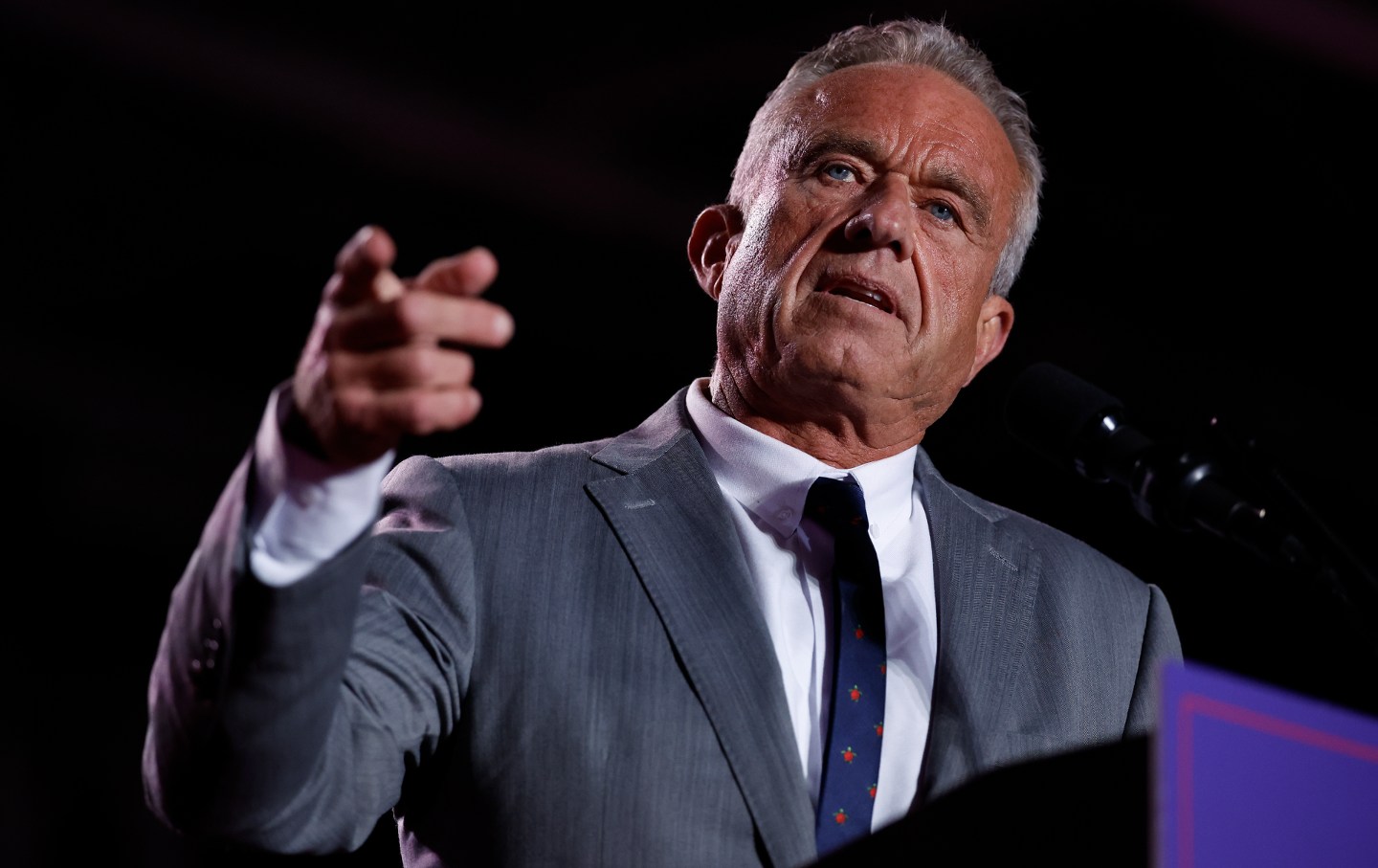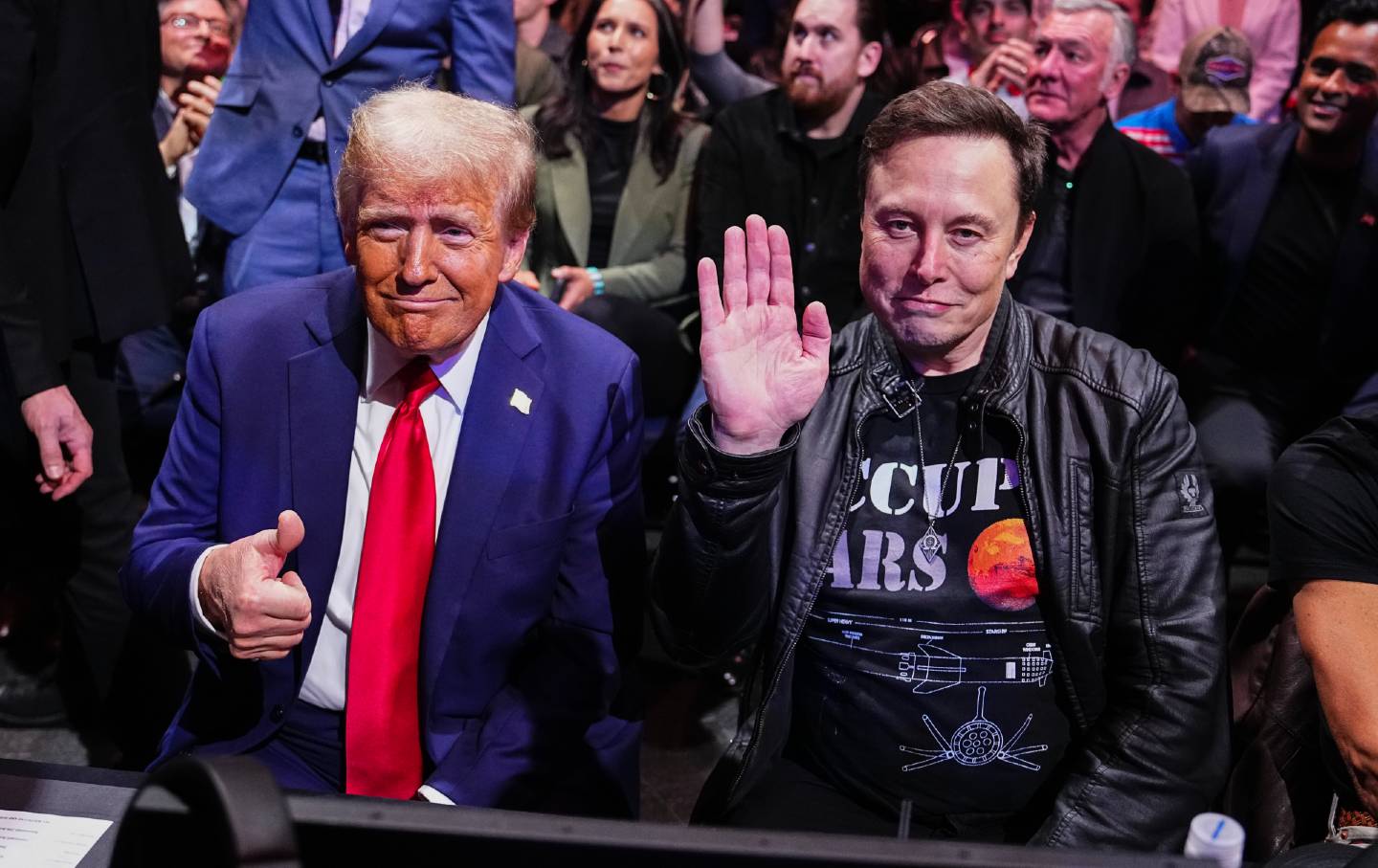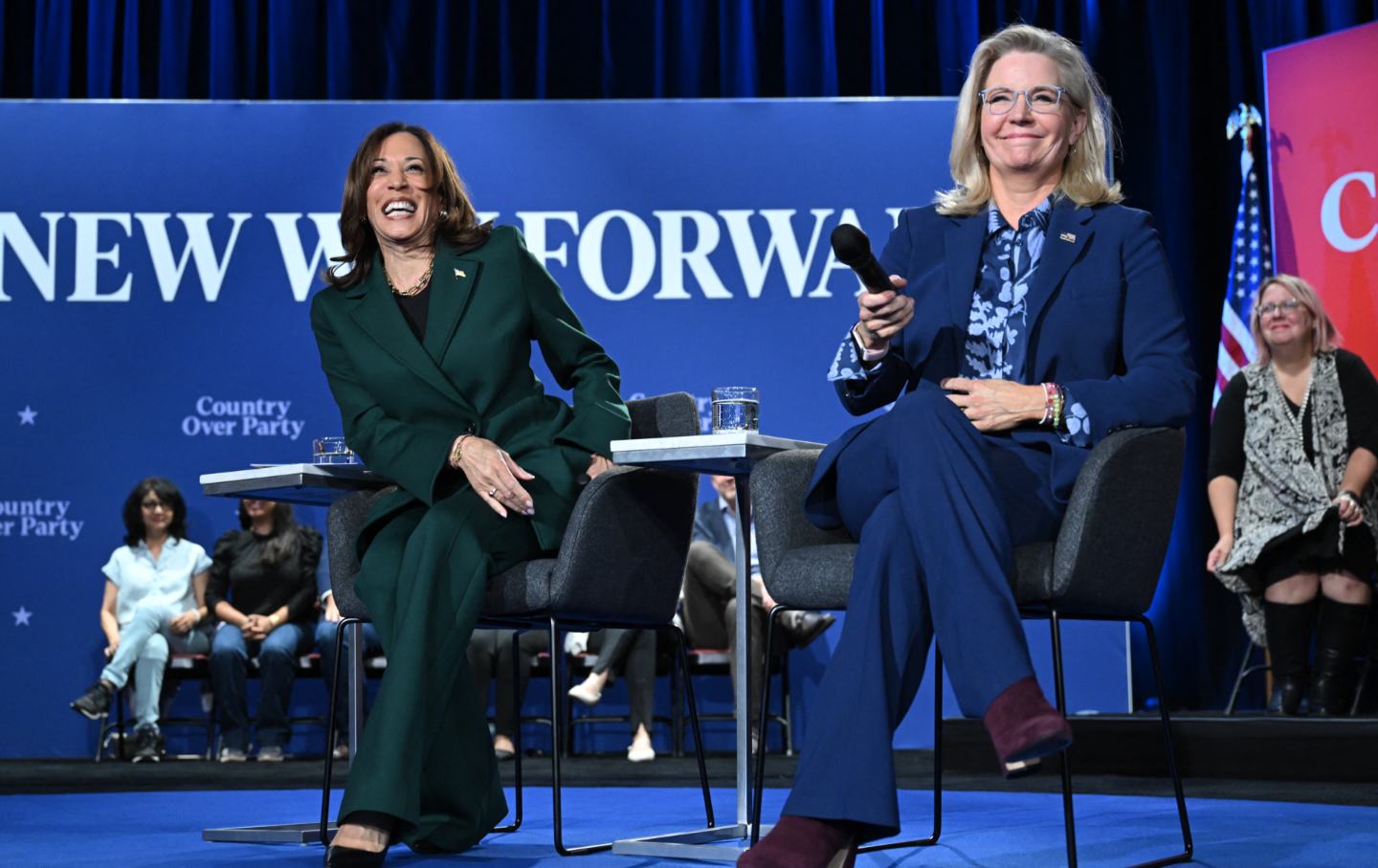Trump’s Lawyers Argue That Their Client Is Above the Law
The former president made an appearance in court as his legal team made the case for his absolute immunity from prosecution.
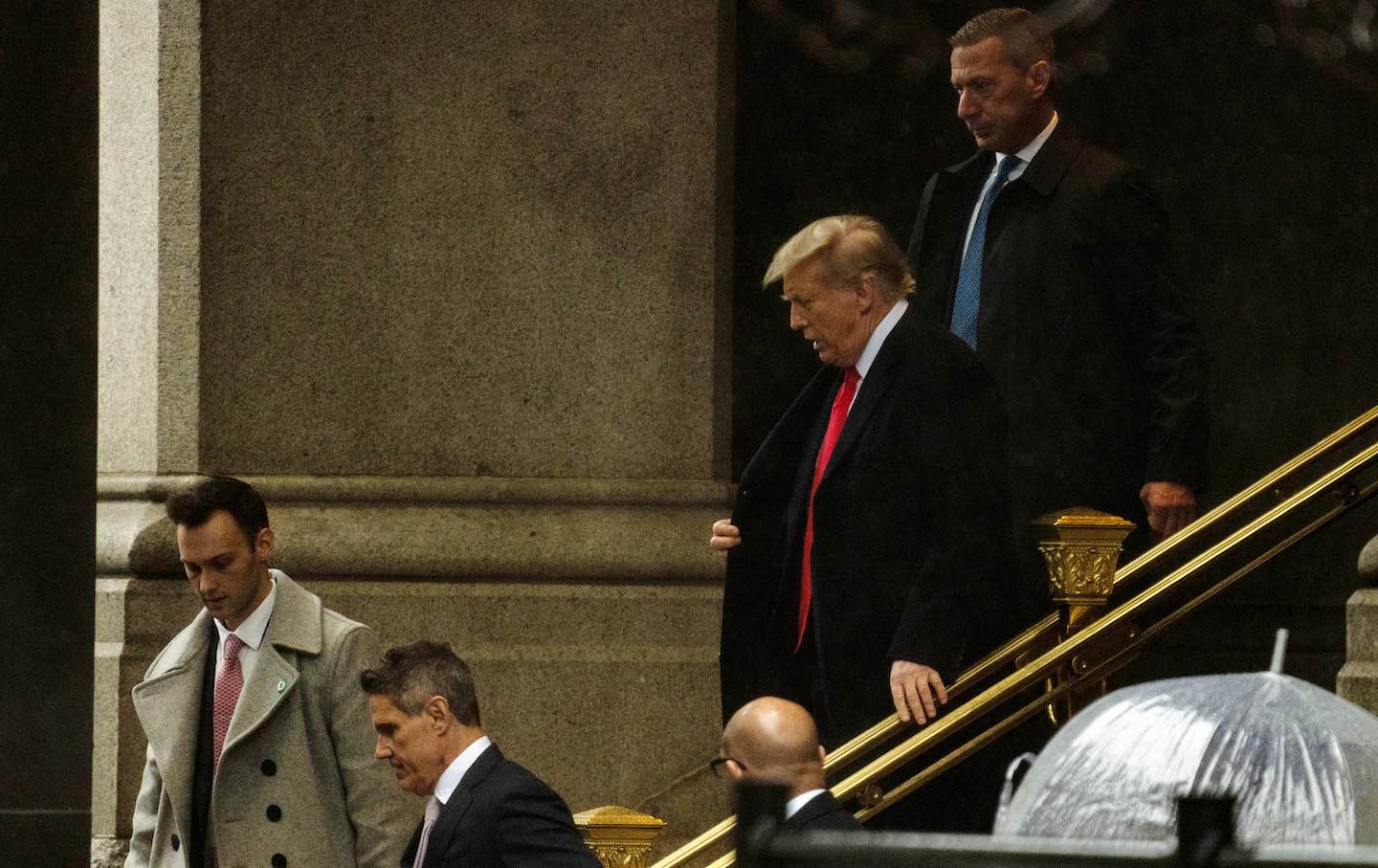
Donald Trump departs the Waldorf Astoria where he held a press conference on January 9, 2024, in Washington, D.C.
(Kent Nishimura / Getty Images)Former president Donald Trump, banking on the 36-point polling lead he holds in advance of the Iowa caucuses, took a day off from his blood-and-soil rally schedule in the Hawkeye state to appear in the D.C. District Court of Appeals as his legal team pleaded for absolute presidential immunity on behalf of their client. In reality, what they were arguing was for the coup-fomenting former president to be granted total impunity—but what’s an extra “m” and a missing “p” in a legal strategy clearly modeled on MAGA guru Steve Bannon’s fabled approach to press coverage: Flood the zone with shit?
Initial reports from the courtroom noted that the three-judge panel hearing Trump’s case was “skeptical,” which is decorous Beltway journo-speak for “goggle-eyed with disbelief.” The jurists promptly caught the effulgent scent of Bannonism in the wind as Trump attorney John Sauer gamely made the case that Trump’s repeated and flagrant lies about the conduct and outcome of the 2020 election were actually part of his presidential duties, and hence not subject to prosecution. “I think it is paradoxical to say that his constitutional duty to take care [that] the laws be faithfully executed allows him to violate criminal law,” Judge Karen Henderson, a George H.W. Bush appointee, drily noted. Judge Florence Pan, a Biden appointee, pressed Sauer for further clarification, asking whether, under this expansive new model of immunity, a president could legally order Navy Seal Team Six to assassinate a political rival. After some procedural hemming and hawing, Sauer actually conceded that, yes, there couldn’t be any prosecution of a president operating in full Corleone mode if the chief executive in question weren’t subject to impeachment and conviction in Congress first. Not only is this a discomfiting prospect for a sitting GOP congressional majority prone to all but literal forms of fratricide itself; Pan’s question wasn’t really the kind of seminar room hypothetical that citizens in a less woozily precarious democracy might hope for.
The day before Trump’s hearing, in fact, Mediaite reported that longtime Trump consigliere Roger Stone was caught on tape telling a former cop confidant that “it’s time to do it”—i.e., time to kill either House member Eric Swallel of California or Jerry Nadler of New York, both consistent Trump detractors on the House Judiciary Committee. Trump himself has marveled that his movement would literally let him get away with murder, while expressing support for the aspiring lynchers of Mike Pence on January 6. (That same day, he told his security detail to let the crowd assembling for his “Stop the Steal” speech bypass gun-detecting magnometers because, as White House aide Cassidy Hutchinson testified, “I don’t f’ing care that they have weapons. They’re not here to hurt me. Take the f’ing mags away.”)
The panel of judges also pointedly noted that the appellate motion appeared to be premature, since Trump’s D.C. District Court trial hasn’t yet started. (A similar motion that special prosecutor Jack Smith and his team filed before the US Supreme Court to settle the immunity claim was rejected on the same grounds.)
But such procedural questions really just skim the surface of the incoherent reasoning behind the Trump appeal. For starters, Trump’s legal team in the Senate trial following the January 6 coup attempt argued for acquittal by using a calculus diametrically opposite to Sauer’s jury-rigged argument: It wasn’t for the Senate to adjudicate Trump’s culpability; no, that would be for the courts to decide once Trump had left office. “There is no January exception to impeachment,” Trump attorney Bruce Castor said in response to a question from GOP Texas Senator John Cornyn. “There is only the text of the Constitution, which makes very clear that a former President is subject to criminal sanction after his Presidency for any criminal acts he commits.”
And the more sweeping logic of Trump’s immunity claim is to supply advance license for a second Trump term that’s already teeming with overtly authoritarian agenda items on the drawing board, from harsh new extralegal border detention measures to punitive ideological purges of the federal workforce. Needless to say, a reelected Trump would be sure to follow through on his campaign pledges to pardon January 6 attackers, punish his various legal pursuers, and initiate bogus legal action against President Joe Biden. It would be the postwar imperial presidency operating on a unique Trump-branded level of chemical enhancement. As veteran White House lawyer Kristy Parker told The New Republic’s Greg Sargent, “Trump has threatened to use the presidency to punish enemies, reward friends, and protect himself. If the courts recognize immunity for the broad array of official acts of the presidency, that will incentivize Trump to abuse those powers further.”
The aspiring wreaker of Oval Office vengeance forcefully underlined this same prospect after he left the courtroom. “I think they feel this is the way they’re going to try and win, and that’s not the way it goes,” Trump said. “It’ll be bedlam in the country. It’s a very bad thing. It’s a very bad precedent. As we said, it’s the opening of a Pandora’s box…. When you talk about the threat to democracy, that’s the real threat to democracy” When a Washington Post reporter followed up by asking if Trump would rule out violence from his followers, the former president walked away without replying.
There’s little indication that the D.C. panel, acquainted as it is with both the Constitution and consensual reality, will rule in Trump’s favor. Yet there’s scant comfort to be found in legal outcomes, as they continue to stand athwart a MAGA movement fiercely whaling away at the rule of law in its efforts to justify violent and illegal seizures of power. “When Trump is facing all these things, he’s doing it for us in our place,” one Iowa Trump supporter told NBC News, likening the Caligulan coup-plotter to Jesus for good measure. Unfortunately for the 2024 electorate, there’s no legal brief that can dislodge that kind of fundamentalist conviction.
We cannot back down
We now confront a second Trump presidency.
There’s not a moment to lose. We must harness our fears, our grief, and yes, our anger, to resist the dangerous policies Donald Trump will unleash on our country. We rededicate ourselves to our role as journalists and writers of principle and conscience.
Today, we also steel ourselves for the fight ahead. It will demand a fearless spirit, an informed mind, wise analysis, and humane resistance. We face the enactment of Project 2025, a far-right supreme court, political authoritarianism, increasing inequality and record homelessness, a looming climate crisis, and conflicts abroad. The Nation will expose and propose, nurture investigative reporting, and stand together as a community to keep hope and possibility alive. The Nation’s work will continue—as it has in good and not-so-good times—to develop alternative ideas and visions, to deepen our mission of truth-telling and deep reporting, and to further solidarity in a nation divided.
Armed with a remarkable 160 years of bold, independent journalism, our mandate today remains the same as when abolitionists first founded The Nation—to uphold the principles of democracy and freedom, serve as a beacon through the darkest days of resistance, and to envision and struggle for a brighter future.
The day is dark, the forces arrayed are tenacious, but as the late Nation editorial board member Toni Morrison wrote “No! This is precisely the time when artists go to work. There is no time for despair, no place for self-pity, no need for silence, no room for fear. We speak, we write, we do language. That is how civilizations heal.”
I urge you to stand with The Nation and donate today.
Onwards,
Katrina vanden Heuvel
Editorial Director and Publisher, The Nation

